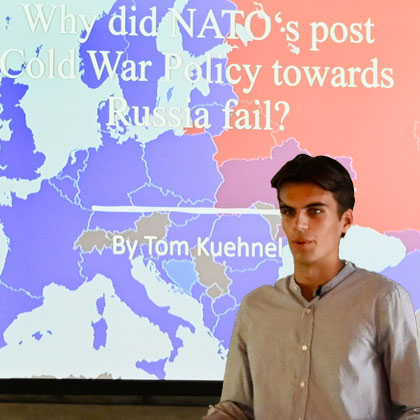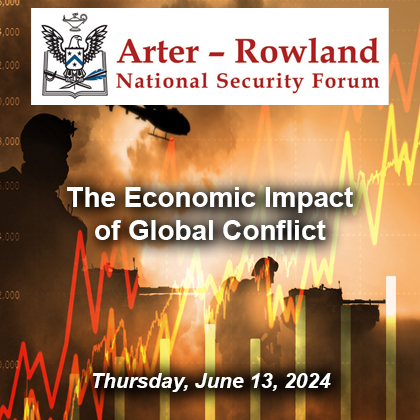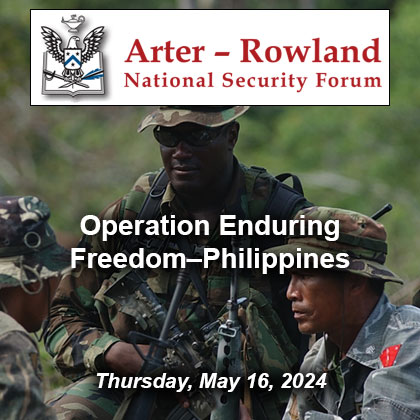Call for Papers: 2018 Ethics Symposium
U.S. Army Command and General Staff College
Ethics Symposium Announcement and Call for Papers
Organizers: The United States Army Command and General Staff College, Combined Arms Center at Fort Leavenworth, Kansas and the CGSC Foundation, Inc. will co-host a symposium entitled:
“The Impact of Diverse Worldviews on Military Conflict”
War is a clash of wills involving human beings with strategic human objectives. The United States has been preparing for or fully engaged in war or military conflict throughout our history. Because war is a very real part of our history, it is vital to comprehend the human dimension of warfare, the purposes and motivations for engaging in military conflict and the moral boundaries of each conflict. We live in an era of fast-moving change characterized by complex threats, force structure challenges and unpredictable resources. Recent history has seen the rise of military operations by non-state actors as well as the increase of dependence on advanced and emerging technologies. Foundational to all these, are the worldview shaping beliefs and values that can either exacerbate tensions or provide common ground for resolution. This year’s CGSS Ethics Symposium will address the ethical aspects of diverse worldviews and their impact on the operational environment upon which our future military leaders are about to enter.
Proposed Program: With this in mind, we are issuing a call for unpublished papers for the symposium. We invite authors to submit their papers for consideration. Selected presenters will be asked to facilitate lively discussions about their work. Please consider the ethical aspects of the topics below and submit an abstract that includes a narrowed topic with a clear thesis statement and brief outline of the topic you intend to write about. This will be an unclassified symposium.
Views of War
- As the United States refocuses on large scale military operations against peer or near peer threats, what ethical considerations should guide the use of military force, personnel or technology as we seek to gain the upper hand without violating our ethical principles?
- Has adherence to the Just War Tradition or international agreements like the Geneva Convention lost its utility as a guide for military conflict with adversaries who may not share our same worldview and ethical underpinnings?
- How do we steel the heart and mind of the American Soldier so that their confidence in political leaders and lawmakers enables them to ethically engage in the application of violence with a clean conscience? How does the United States’ approach to war impact the moral resiliency of the Soldier?
- Have policy makers in the United States moved away from the Just War criteria found in the Western Just War Tradition, such as “just cause” and “last resort,” and, if so, what criteria are now in use? How do policies such as the so-called “Powell Doctrine” or the “Weinberger Doctrine” or other more recent doctrines fit with or challenge the original Just War principles?
- What is the ethical impact on the American Soldier, Sailor, Airman or Marine if traditional Just War principles are eroded or revised?
- How do other nations view the ethics of war? How does this compare/contrast with the United States’ view on the ethical conduct of war?
- How does the rest of the world view the criteria used by the United States to justify military interventions and other military operations? Have views of the U.S.’s moral authority changed, for better or worse, due to the country’s military actions?
Regional, State, Non-State Challenges or Emerging Threats
- How can we determine the prevailing worldview or ethical framework of a specific state or a group of non-state actors? How important is it to understand the prevailing worldview or ethical framework of states or groups with which we are in conflict? Or of our Allies?
- Can we increase cooperation and decrease conflict in various regions of the world by learning more about the underlying issues that generated conflict? Or is that information only useful before conflicts arise and after military solutions have been enacted (in the post-conflict rebuilding phase)?
- What are some of the key underlying political, economic, or cultural issues in the following areas that might not be well understood by U.S. participants: North Korea, China, Russia and the “near abroad,” the Philippines, Caucasus, Syria, Iran and its neighbors, or the African continent?
- What ethical implications do recent military activity in Syria, the Ukraine, and Russia’s “New Generation Warfare” have for potential future conflict?
- What U.S. military involvement can we expect in the future against IS? Does IS have an ethical code with regard to conduct of war/conflicts? Does the U.S. have a regional obligation to deal with the threat of IS? What are our ethical obligations to regions where IS has spread?
- What are the non-conventional or emerging threats the world will face in the next decade and how is America ethically prepared to engage those threats? Can we predict any of these conflicts or threats through a better understanding of different worldviews?
- What are the different ethical approaches of private enterprise and national security entities? Can those differences be reconciled in order to maintain public trust and preserve national security?
Military, Academic and Professional Scholarship: It is the goal of Command and General Staff College and the Command and General Staff College Foundation to facilitate lasting relationships among the military and civilian academic community. To accomplish this goal, we will invite military, academic and professional personnel to participate in this year’s symposium. This will allow us to build a community of expertise that includes both military and non-military thinkers.
For additional information or to send abstracts, contact the conference coordinator:
Chaplain (Major) Jeff McKinney
jeffrey.t.mckinney3.mil@mail.mil
913-684-3270
Abstracts should be 300-500 words.
Deadline for abstracts: January 12, 2018
Notification of abstract selection: January 19, 2018
Deadline for final papers: April 20, 20218
Symposium Event: April 30 – May 1, 2018
(Presentations will be conducted on April 30th)
The Command and General Staff College and the CGSC Foundation, Inc. will published selected papers.
Faculty and Students at CGSC please see notes below:
Faculty at CGSC: CGSC Faculty are encouraged to write and present papers for the Ethics Symposium. Papers will be published after the event making faculty eligible for the Silver Pen Award demonstrating excellence in the scholarship domain of faculty development. Papers will also be submitted for a Faculty Ethics Writing Award to be presented during the symposium.
Students at CGSC: Students at CGSC have three opportunities to participate in the Symposium. First, the Ethics Symposium will be conducted for the entire CGSC class. Second, any student who wishes present may enroll in A740 during the elective period. A740 will equip students to write for publications and conduct dynamic presentations. Papers written for the symposium will also be submitted for a writing award and published in a professional publication following the symposium. Third, MMAS students will have the opportunity to write MMAS papers in line with the topic and present their papers as part of their preparation for their thesis defense in coordination with their MMAS committee.
For the most updated information on the 2017 Fort Leavenworth Ethics Symposium visit
READ THE LATEST UPDATES FROM THE SIMONS CENTER
"*" indicates required fields


